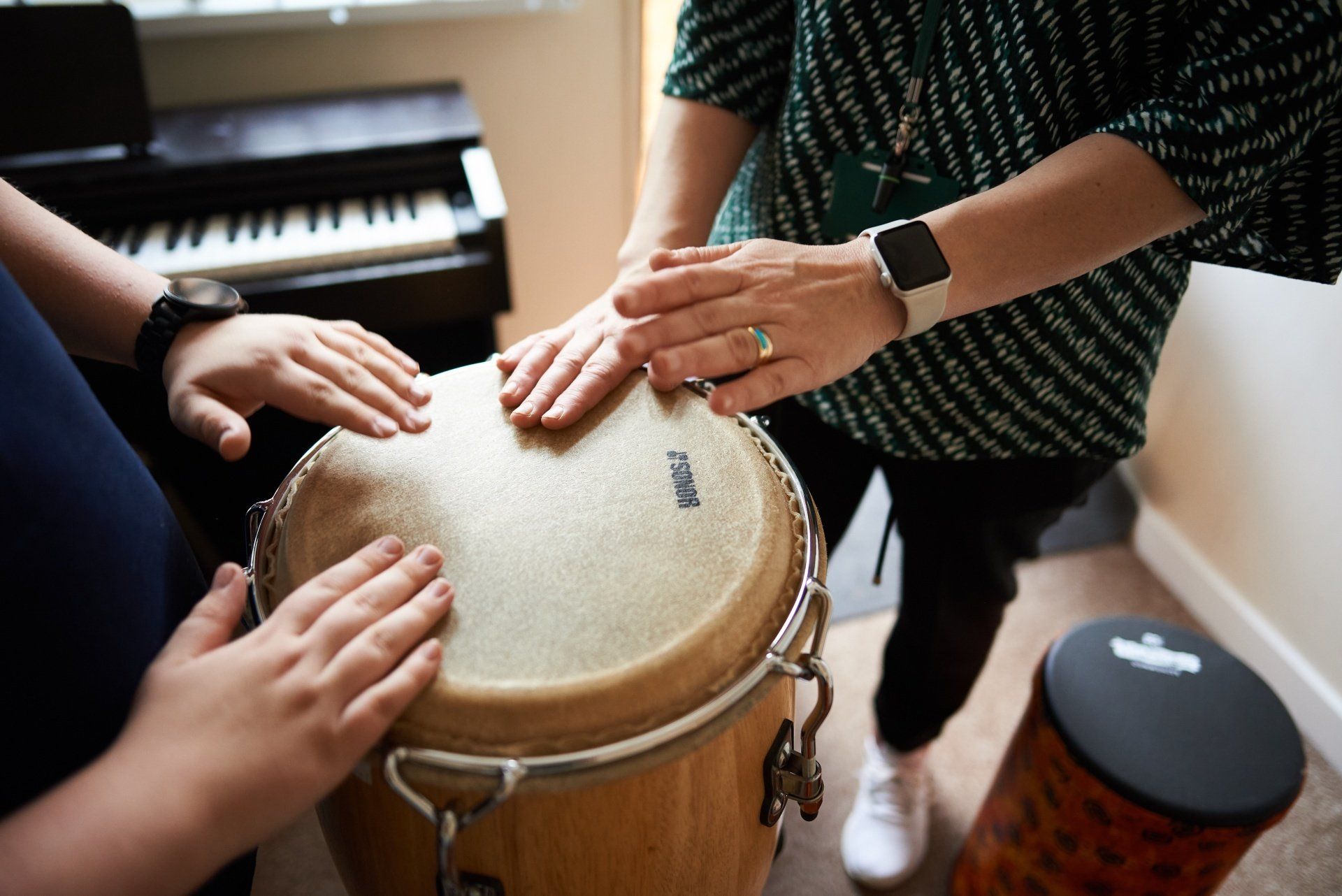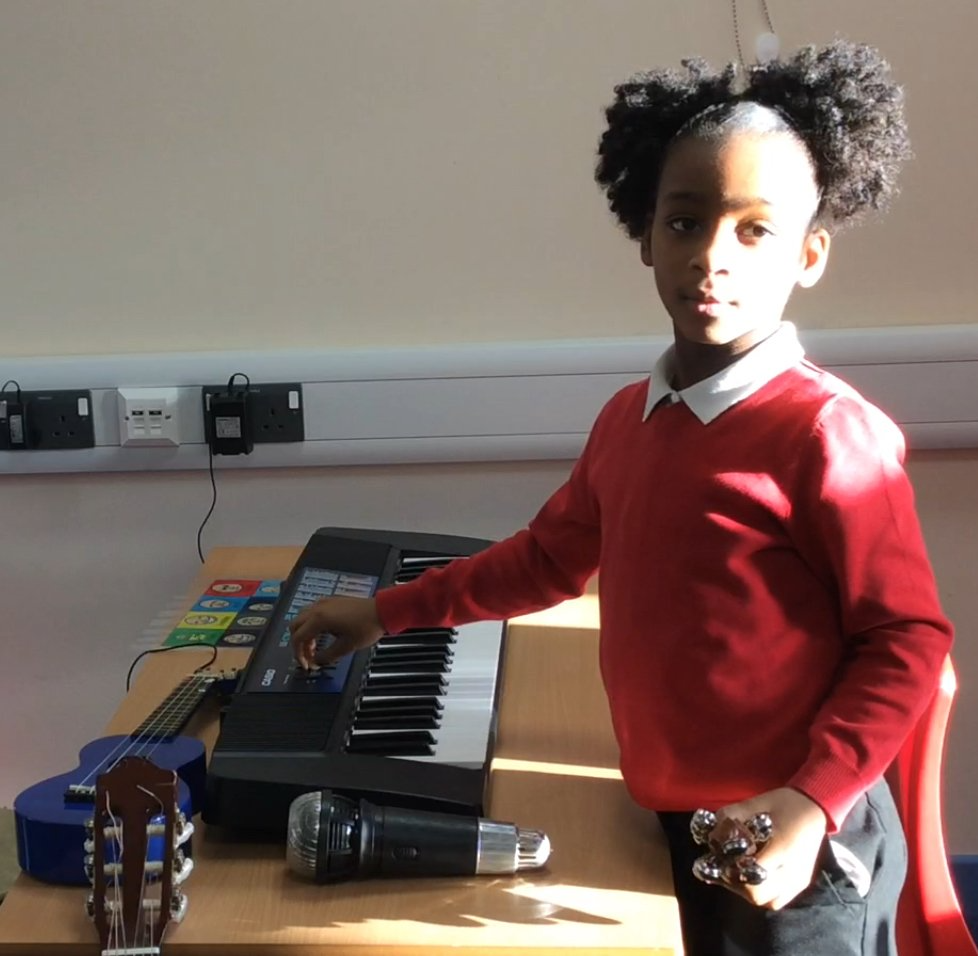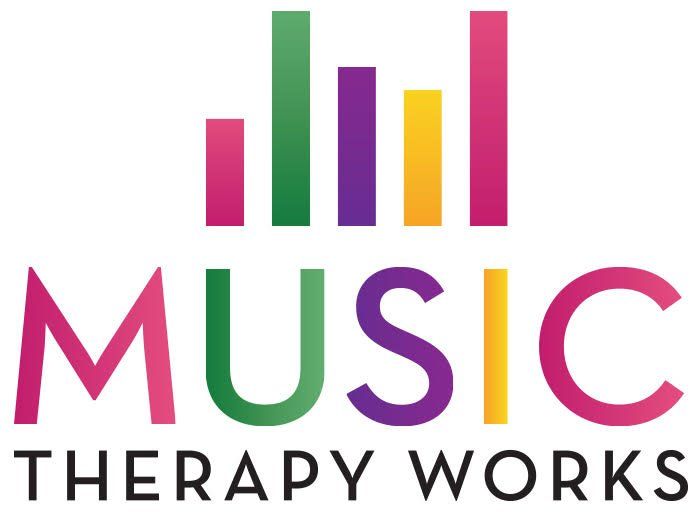FREQUENTLY ASKED QUESTIONS
Q: Can you tell me more about the role of a music therapist at Music Therapy Works?
A: The role of a Music Therapy Works’ music therapist can vary depending on the setting and population they are working with. In general, our music therapists will use music interventions to address a range of emotional, cognitive, physical, and social strengths and needs of individuals.
This may include creating and leading music sessions to improve communication, physical function, and emotional expression. Therapists may also use music to help clients achieve non-musical goals such as reducing anxiety, managing pain, or improving memory.

Q: What qualifications or experience are required to become a music therapist at your organisation?
Music Therapy Works welcomes both newly qualified and experienced music therapists to join our team.
We believe that a combination of fresh perspectives and diverse experience is essential for providing the highest quality care to our clients.
Whether you are just starting out in your career or have years of experience, we value your skills and are committed to providing you with the support and opportunities you need to succeed.
We offer comprehensive training and professional development programs, as well as opportunities for mentorship and growth, to help you reach your full potential.
We follow the UK standards for a Music Therapist to practice, regulated by the Health and Care Professions Council (HCPC) to ensure the safety and well-being of the public by setting and maintaining standards of professional training, performance, and conduct of its registrants.
To practice as a music therapist in the UK, an individual must:
- Hold a recognised music therapy qualification from an accredited institution.
- Be registered with the HCPC.
It is important to note that the HCPC standards need to be met to maintain the registration and to remain in good standing.

Q: What type of clients do you typically work with?
A: Our music therapists typically work with a wide range of clients, including:
- Children and young people, including those in mainstream education, special education needs (SEN) settings, students experiencing behaviours of concern, Pupil Referral Units (PRUs), and those in foster care, care homes or other forms of out-of-home care.
- Adults and young adults with learning disabilities to support communication, social interaction, and other developmental tasks.
- Individuals on the autism spectrum to support social interaction, communication, and sensory processing.
- Children, adolescents, and adults in mental health settings, such as hospitals, clinics, and community mental health centres. These clients may have a range of mental health conditions, including depression, anxiety, and post-traumatic stress disorder (PTSD).
- Older adults, who may be dealing with age-related issues such as dementia, depression, and physical limitations.
- Individuals with neuro-disabilities such as stroke, brain injury, and Parkinson's disease, which can affect movement, speech, and cognitive function.

Q. What is a typical day in the life of a
Music Therapy Works' therapist?
A: A typical day in the life of a Music Therapy Works’ music therapist might include:
- Planning and preparing for sessions: Before seeing clients, music therapists may spend time preparing for upcoming sessions. This may involve selecting setting up instruments, creating new songs and resources, reviewing client referrals and liaising with the on-site staff team.
- Meeting with clients: A significant portion of the music therapist's day will be spent meeting with clients individually or in groups. During these sessions, MTs use different music interventions to address the emotional, cognitive, physical, and social needs of clients.
- Collaborating with other healthcare professionals: Music therapists are expected to spend time collaborating with other healthcare professionals, such as speech and language therapists, occupational therapists, and psychologists, to share information, acquire bigger picture views and coordinate intervention plans for clients.
- Documenting client progress: Our music therapists document their clients’ progress through clinical note-taking and using the Music Therapy Works’ evaluation and outcomes approach. Preparing reports for social workers, schools, clients and their families is also an important part of the role.
It's important to note that the music therapist’s schedule may vary depending on the setting they are working in; school, hospital, community centre or care home. Additionally, some music therapists may work part-time or on a flexible schedule, while others may occasionally work evenings or weekends to accommodate clients' schedules.

Q: Can you tell me about any ongoing training or professional development opportunities for music therapists at your organisation?
Music Therapy Works offers in-house training and professional development opportunities for all its music therapists including 4 in-person CPD training days per year, for which music therapists are paid to attend,
These can be an effective way for our music therapists to update and acquire new techniques, remain current with the latest research and best practices, and build relationships with other team members.
- We offer an annual personal CPD allowance that can be used to attend external training and professional development opportunities. This can be an effective way for music therapists to gain specialised knowledge and skills that may not be available in-house.
- Digital term-time training and professional development sessions are also provided. These offer a flexible and cost-effective way for music therapists to continue their education while balancing work and personal commitments.
- Regular 1:1 meetings for music therapists to identify goals, receive progress feedback and build a stronger relationship with their line manager.
The specific training and professional development opportunities offered by Music Therapy Works may include both practical, theory, emerging specific needs of the music therapists.
We consider CPD to be of vital importance for music therapists to maintain their knowledge, skills and competences, and to ensure that they are providing the best possible care for their clients.
We offer a variety of different types of CPD that are good for music therapists, including analytical, practical, theory-based, psychotherapy and specialised areas of interest.
Q:What day-to-day support does a music therapist receive?
A:
- A clinical lead support service. This offers guidance, advice and support on clinical issues, consultations and mentoring to music therapists working in the field. The clinical lead can respond quickly and offers help with best practice solutions, maintaining ethical and professional standards and dealing with challenging situations.
- A peer-to-peer system and dedicated WhatsApp group allows us to connect and collaborate with each other.
- To empower our music therapists to use the latest technology and resources, a professional toolkit is provided to include:
- Full access to a high level and robust Office 365 system with a complete range of applications such as Word, Excel, PowerPoint, Outlook, OneNote, SharePoint, Teams and more allowing for seamless collaboration, communication and streamlined workflows.
- An iPad, pencil and keyboard folio to use in your sessions as a music therapy resource and to be utilised for recording, note-taking and visual aid access.

Q: What qualifications or experience are required to become a music therapist at your organisation?
Music Therapy Works welcomes both newly qualified and experienced music therapists to join our team.
We believe that a combination of fresh perspectives and diverse experience is essential for providing the highest quality care to our clients.
Whether you are just starting out in your career or have years of experience, we value your skills and are committed to providing you with the support and opportunities you need to succeed.
We offer comprehensive training and professional development programs, as well as opportunities for mentorship and growth, to help you reach your full potential.
We follow the UK standards for a Music Therapist to practice, regulated by the Health and Care Professions Council (HCPC) to ensure the safety and well-being of the public by setting and maintaining standards of professional training, performance, and conduct of its registrants.
To practice as a music therapist in the UK, an individual must:
- Hold a recognised music therapy qualification from an accredited institution.
- Be registered with the HCPC.
It is important to note that the HCPC standards need to be met to maintain the registration and to remain in good standing.

Q: How does Music Therapy Works measure the effectiveness of music therapy in client outcomes?
A: We use a specific evaluation approach with both quantitative and qualitative capabilities to gather data and track progress in different areas, such as communication, emotional well-being, social skills and physical abilities.
This data helps us to ensure we are providing the best possible care and to demonstrate to our purchasers, parents and carers how the therapy is helping the individual.
By using this evaluation method, we find that they can easily understand and gain the full picture of each person's progress and any factors that may be impacting it.
Q: What client groups do you work with?
We work with a wide range of client groups including: babies, children, young adults and older adults with diverse needs who may be experiencing learning disabilities, communication skills, ASC, SEMH, abuse, stress, trauma, eating disorders, behaviours of concern, emotional and behavioural disorders and in palliative care.

Q. How does Music Therapy Works support the growth and development of music therapists in their careers?
A:
- By encouraging interdisciplinary team collaboration, we foster an environment that encourages music therapists to gain insight and knowledge from other healthcare professionals and to learn from their peers. We encourage music therapists to explore opportunities to collaborate and share with other professionals such as SALTs, psychologists and psychotherapists, social workers, education staff, healthcare professionals, physical and occupational therapists to draw on their strengths and expertise.
- With opportunities for career advancement music therapists can progress their careers in areas such as leadership and management.
- By supporting participation in research to help advance the field of music therapy and increase the knowledge base around the effectiveness of music therapy.
We are proud to showcase the talents and achievements of our music therapists and take great care to recognise their hard work and dedication.
We regularly share case studies at clinical discussion forums and enter rising star individuals for awards to highlight the exceptional work of our team members and demonstrate Music Therapy Works’ commitment to excellence.

Q: How do you support the cultural and individual needs of clients in music therapy?
We are committed to providing culturally competent care to all of our clients in music therapy. Our therapists are trained to recognize and appreciate the cultural diversity of each individual.
We understand that culture plays a significant role in shaping an individual's experiences, beliefs, and behaviours and it is important to honour these in the therapy sessions. By doing so, we are able to provide therapy that is tailored to the specific cultural needs and perspectives of each client.
Wherever appropriate, we encourage client and family participation to help ensure that the music therapy service is tailored to the individual needs of the client and is culturally appropriate.
Where possible, we liaise with interpretation and translation services to communicate with clients who may have limited English proficiency or who have hearing or speech impairments.
Q: How can I get in touch?
If you would like more information on joining the
Music Therapy Works' team, we’d love to hear from you.
Just choose the most convenient method and we’ll get back to you as soon as we can:
Phone: 07710 782256
Email: chiefexecutive@musictherapyworks.co.uk.com
Alternatively download our application form here:


